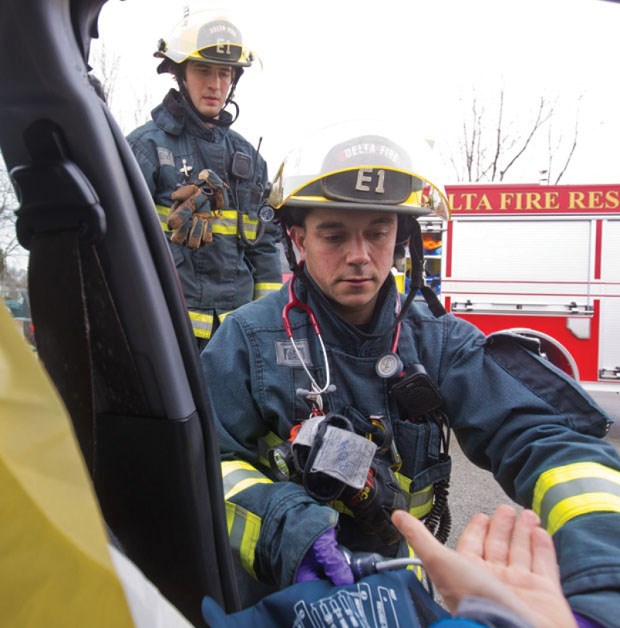Delta’s highly trained firefighters are being left out of emergency calls due to a new dispatch protocol, something that has Mayor Lois Jackson calling for a change.
“Between the end of May and now, we’ve had a reduction of 40 to 60 per cent in the calls we are receiving to our fire department to go and help people,” said Jackson.
What has the mayor concerned is a change implemented in May to 911 protocols, which has resulted in calls being directed to and controlled by BC Ambulance. Fire departments are notified only if there are certain types of emergencies.
“We in Delta pay over $3 million for the 911 service for our people. We have trained up our fire department to EMR (emergency medical responders) standard, so if you have somebody on the ground, and I’ve been there several times recently with my own daughter, a minute feels like five hours… you’re waiting and waiting and waiting,” said Jackson.
“We know that the response times for ambulance, according to the stats we keep, are much longer than they claim they are and much longer for the average area. We’re so spread out in Delta and we’ve only got the two ambulance stations. And then there’s the traffic to deal with. We’re paying all this money for response calls and they’re sending them all to BC Ambulance.”
Since acquiring enhanced training in 2015, Delta’s firefighters had been dispatched simultaneously during a 911 call involving a medical emergency. They’ve been providing advanced care to accident and other victims, administering pain relief medication, taking blood pressure, using pulse oximeters, administering IVs and providing airway management.
According to city officials, firefighters can get to most accident scenes within three to eight minutes, while paramedics are 10 minutes or more behind.
“I have said I want those calls simultaneously listened to by our fire department. They will decide who goes and if it is an emergency, our fire department can dispatch minutes earlier. We have said, ‘We want the calls,’ and they have said, ‘We’re not going to give them to you.’”
Jackson has put forward a notice of motion to the Metro Vancouver board to call on E-Comm to change the protocol to allow communities like Delta to receive simultaneous calls.
When Delta began its enhanced training for firefighters, the move didn’t go over well with BC Ambulance.
Earlier this year, Delta received a letter from Cameron Eby, provincial president of the Ambulance Paramedics and Emergency Dispatchers of B.C., CUPE Local 873. The paramedics union has been lobbying for improved ambulance and paramedicine services in communities such as Delta.
Calling it dangerous and a potential overload of firefighters, the letter states, “Given their superior level of training and equipment, B.C. paramedics are the only frontline medical professionals qualified to handle B.C. patients during a medical crisis for early assessment, critical intervention, treatment, monitoring, transport and continuum of care to the emergency department.”
Eby’s letter called for an investment in more paramedics and raised concern over the downloading of emergency response to firefighters.
Delta’s response was that its firefighters are providing a value added service by working alongside paramedics or before their arrival.



